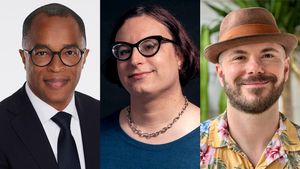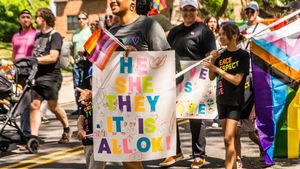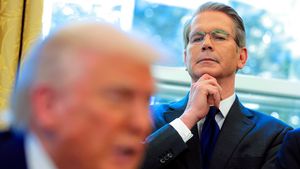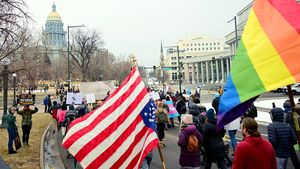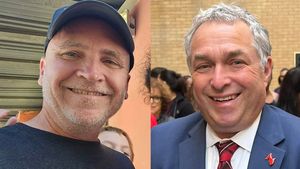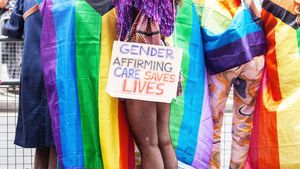More people are out and proudly queer than ever before. According to a 2023 Gallup poll, 7.6% of American adults identify as LGBTQ+, a huge leap from 5.6% in 2020. That count more than doubles when looking specifically at Gen Z adults, a demographic where 20.8% of respondents identified as LGBTQ+. Gay women are everywhere, but what do you do if you can't find any because your gaydar is broken?
Queer people have always had a knack for finding each other, but what do you do if you're here and you're queer, you're single and ready to mingle, but you have no gaydar whatsoever? Yes, there are queer specific dating apps, but if you're trying to get better at assessing if that cute stranger is flirting with you in real life and in real time, we have some experts — a social worker, a relationship expert from Taimi (an LGBTQ dating app), and a licensed sexologist — for their advice on how to navigate finding potential partners, and their practical tips for honing your gaydar!
What is "gaydar?" Does everyone have it?
Gaydar, a portmanteau of "gay" and "RADAR", is a queer person's ability to recognize other queer people. I think it's best encapsulated in the song "Ring of Keys" from Fun Home, the musical adaptation of Alison Bechdel's graphic memoir of the same name. In "Ring of Keys," Young Alison, while out to lunch with her father, sees "an old school butch" for the first time and immediately recognizes herself in the woman. Years before Alison Bechdel even knew what being gay was, years before becoming one of the most prolific modern lesbian artists, she still knew that she and this butch were cut from a similar cloth.
When we reached out to Savannah Eklund, a licensed clinical social worker who works primarily with LGBTQ+ people and women, to ask about finding prospective partners, she defined gaydar as, "the ability to recognize other queer people through subtle cues like style, body language, or shared cultural references."
Rest assured, however universal it may seem, not everyone has a functioning gaydar. Eklund added, "While some people seem to have a natural knack for it, gaydar isn’t universal or foolproof. It’s often shaped by your environment, exposure to LGBTQ+ spaces, and, unfortunately, stereotypes.
"If you feel like your gaydar is 'broken,' you’re not alone. People who came out later in life or grew up in environments with little queer visibility might find it harder to rely on intuition alone. And that’s okay! Recognizing someone’s queerness doesn’t need to be a guessing game—it’s more about creating spaces and conversations where connection can happen naturally."
If you're someone new to queer environments, and you want to hone your gaydar, here are things you can do to get better at recognizing other queer people out in the wild.
Subtly drop hints that you are queer and see how they respond
Angelika Koch, a relationship and break-up expert for the LGBTQ+ dating app Taimi, tells PRIDE that "wearing a bracelet or a necklace with a rainbow on it can show you are a part of the community, so there is no question where you stand while meeting people."
Eklund advises something similar, adding that it doesn't have to be obvious to everyone, it just needs to be something that your prospective paramour will pick up on. "You don’t need a neon sign that says, 'I’m queer!' to signal your identity," she says, explaining, "Small, meaningful details can create opportunities for others to recognize you and feel safe approaching you."
She also adds that this doesn't just apply to accessorizing, but all facets of queer culture. Asking people about their thoughts on queer musicians or artists, mentioning LGBTQ+ shows in conversation, or carrying a book by a queer author can all work well to signal to others that you're queer. And if you're trying to hone your gaydar, these are great subtle signals to be training yourself to look for as well!
Go to IRL queer spaces
The hardest part about meeting people? You have to go out and meet people.
If you're looking to meet other queer women, going to queer specific spaces, events, and organizations is a tried and true method. Sophie Roos, a licensed sexologist and writer for the Swedish sex-positive magazine Passionerad, gives gay bars her resounding endorsement.
"My favorite place to meet other queer women and NBs, regardless if it’s just for making friendly contacts, or if it’s with the intuition to date or find sex partners (I did the latter before, not anymore though since I have a partner), is to attend a gay bar," Roos says. "This is not only a place where you’re almost fully sure all people are queer, it’s also a place where you can train your gaydar and by gaining your own experience try to get better at spotting other queer women."
Gay bars aren't your only option. There are plenty of LGBTQ+ groups for basically any activity. Roos suggests checking Facebook for any groups in your area. If there are none, start one!
Eklund and Koch also suggest volunteering — a great way to give back to your community and meet hot singles in your area at the same time. "Volunteering not only helps the community but also connects you with people who share your values," Eklund says.
If all else fails, there are always dating apps
If you don't want to have to question at all whether or not someone is queer, dating apps are perfect.
Dating apps aren't just good if you're nervous about your bad gaydar, there are other benefits too! "Going on queer apps like Taimi can help you to meet other queer people in your area. This is a wonderful option for those who have odd working hours and struggle with finding time meeting someone during regular daytime hours," Koch says.
Many other queer dating apps have options to look for platonic connections too! Bumble is Roos's personal favorite. She says, "I especially recommend Bumble since it has relatively many queer women on the platform, but especially because you can choose to find either people looking for a romantic relationship, or people who’re looking for friends!" Lex is another great app for finding queer connections of all kinds.
Just remember, that whatever you wear, and wherever you go, queer people are everywhere! You just have to know how to look.
Experts:
Savannah Eklund, a licensed clinical social worker
Angelika Koch, a relationship and break-up expert for the LGBTQ+ dating app Taimi
Sophie Roos, a licensed sexologist and writer for the Swedish sex-positive magazine Passionerad























































